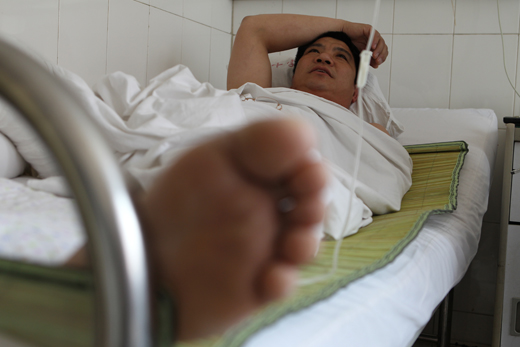Focus
Headmaster of protest school battles for compensation
By Wang Wei (China Daily)
Updated: 2010-05-20 07:46
 |
Large Medium Small |

Luo Chao says he will remain defiant. WANG JING / CHINA DAILY |
From his hospital bed, Luo Chao, 47, talks about his soon to be demolished school for migrant children and his fight for compensation.
On the morning of May 1, after failing in his many attempts to obtain compensation, Luo climbed on the roof of Cuigezhuang Experimental School with a gas cylinder to protest.
After a four-hour standoff with police and the Cuigezhuang village committee, he stepped on a loose steel board and fell from the roof. He was sent to the 999 emergency rescue center.
"The pain is killing me. I haven't been able to get any decent sleep since I've been here," he said from his hospital bed, his left leg in a plastic cast.
The head nurse at the hospital said: "The wound is very serious. Whether he can fully recover depends on how his rehabilitation goes."
| ||||
However, despite his injuries, Chao is still defiant.
"My relative is guarding the school. If someone is going to demolish my school without giving me reasonable compensation, I am going to rush there, even with my leg in plaster, to protect the school again even at the expense of my life," he said.
He paused after those words, took a deep sigh, and started talking about the sufferings and difficulties he has had to endure operating a school for the children of migrant workers.
He signed a 20-year lease with his landlord, Zhao Kui, with whom he has a very good relationship, he said, and invested more than 1,000,000 yuan in the infrastructure and faculty of the school.
"I feel proud to be the headmaster of a school. Especially as it provides underprivileged children the chance to study the same as their city counterparts," he said.
However, the village committee has ordered the demolition of his school without offering him any compensation.
Luo, from Xinyang, Henan province, is no stranger to hardship. When he was four, he was crippled by an injection, when the needle hit his spinal nerves. This was followed by the loss of his left arm to a combine harvester while he played in a field when he was 13.
His disabilities didn't prevent him being elected as deputy village head in recognition of the investment he brought in for the village's development. But he realized he couldn't make ends meet for his wife and two children on the monthly wage of 350 yuan. So he quit the job and came to Beijing in 2001 looking for opportunities to provide his family with a comfortable life.
When he heard that some people from his home town had made a fortune establishing a school for the children of migrant workers, he decided to give it a try.
"I was very excited when I found a place that had a big space for a school playground at Cuigezhuang village," he said. "I immediately signed the contract and started the school."
Few migrant workers could afford the 2,000-plus yuan fee charged by public schools at that time and he had 250 students the first semester. He hired 10 teachers with community college or above diplomas.
Everything went very well until the outbreak of the SARS epidemic in 2003. Luo said the village committee and the Chaoyang education commission ordered him to shut down the school immediately.
"I thought I should do whatever the government said, so I closed it," he said. "But I became the only one of the eight schools for migrant children in the village to shut down."
He said the other seven resumed classes after suspending operations for a few months and most of them are still operating very well.
After a year strolling around the city and looking for jobs, he decided that being the principal of a school for migrant children was the most suitable job.
So in April 2004, he borrowed about 600,000 yuan from eight friends and relatives and invested 1,000,000 yuan in a new school.
"I thought all of my efforts and investment would pay off in five to 10 years, but it turned out to be the start of a real nightmare," he said.
In February, Luo's new school and another eight primary schools and a dozen kindergartens for the children of migrant workers received a notice from the village committee ordering them to vacate their premises before Feb 28. It was a move that would leave 4,000 children of migrant workers without a school, according to Luo.
Some of his students were sent to other schools for migrant children, some returned home and the rest were stranded without a place to study, he said.
In April, during the period of China's National People's Congress and the Chinese People's Political Consultative Conference, some principals of schools for the children of migrant workers were planning to file a petition against the Cuigezhuang village committee challenging the relocation of their schools before new locations were provided. The information was leaked to the village committee, Luo said.
He was "invited" to the office of the village committee to talk about relocation for these children but then was prohibited from leaving for more than four hours.
"When I insisted on leaving, some of the officials from the village committee and guys in police uniform followed me wherever I went for two days," he said. "They didn't want us to appeal to the higher authorities," he said.
Lying in his hospital bed, he is left anxiously waiting for the decision on whether he will finally get his compensation from the village committee and landlord.
But he said, "I will never touch the business of a school for migrant children again. I prefer to sell baked sweet potato on the street."

